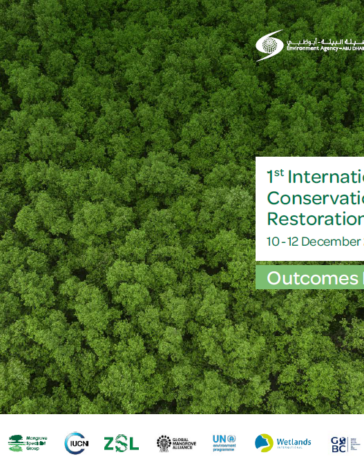
First International mangrove conference issues key recommendations to drive global mangrove action
-
Aquaculture, fisheries and coastal agriculture
-
Climate mitigation and adaptation
-
Coastal resilience
-
Coastal wetland conservation
-
Mangrove Breakthrough
-
Biodiversity
-
Climate change
-
Coasts & Deltas
Outcome document 1st International Mangrove Conservation and Restoration Conference
The 1st International Mangrove Conservation and Restoration Conference (IMCRC), held in Abu Dhabi in December 2024, has released a landmark Outcome Document outlining key global recommendations to accelerate best practice mangrove conservation and restoration.
The conference brought together 300 experts from 82 countries, spanning government, academia, civil society, and the private sector. The document calls for urgent, science based action across three priority areas:
1 Scaling up Restoration Best Practices and Innovation in Restoration Monitoring
2 Enhancing Climate Resilience and Disaster Risk Reduction
3 Scaling Innovation and Strengthening Governance
The urgency is clear. The speed of mangrove loss has declined in recent years, but substantial areas are still being converted and climate change will continue to impact coasts and communities, and we stand at a turning point.
Yet, the opportunity is equally immense. Leading scientists at the IMCRC conference highlighted that over 800,000 hectares of mangroves are available for restoration globally, including 160,000 hectares of disused aquaculture ponds in Southeast Asia alone, of which at least 100,000 hectares are potentially restorable. Research has provided us with the information to achieve this ambition, from understanding the root causes of loss and degradation to setting clear goals, selecting the right approaches, and implementing long-term monitoring. However, critical gaps remain—including inadequate community involvement, land tenure complexities, misguided restoration targets and interventions, and insufficient funding mechanisms.
The discussions over the three days reinforced a crucial truth: mangrove restoration is not just about planting trees—it is about restoring entire ecosystems and the services they provide to people and nature. To ensure long-term success, restoration efforts should follow best-practice principles such as
Ecological Mangrove Restoration (EMR)—focusing on restoring natural conditions rather than defaulting to mass planting initiatives in inappropriate locations to achieve scale.
Mangrove conservation and restoration is also not just about locking away carbon—it is critical to sustain resilient coastal communities in an uncertain future. Success depends on integrating science, implementation, and people, ensuring restoration efforts are socially just, ecologically sound, and financially sustainable.
This document reflects the outcomes of the IMCRC conference and our collective commitment
to advancing global mangrove conservation and restoration efforts in alignment with the objectives
of the Mangrove Breakthrough, The Abu Dhabi Mangrove Initiative and The Global Mangrove
Alliance.
The IMCRC was hosted by the UAE under the leadership of the Environment Agency – Abu Dhabi in partnership with The Global Mangrove Alliance, the IUCN Mangrove Specialist Group, ZSL, Wetlands International, Mangrove Action Project, Emirates Nature-WWF, University of Cambridge, The United Nations Environment Program (UNEP), the United Nations Decade on Ecosystem Restoration, the United Nations Educational, Scientific and Cultural Organization (UNESCO), University of St. Andrews and the Global Ocean Decade Programme for Blue Carbon.

